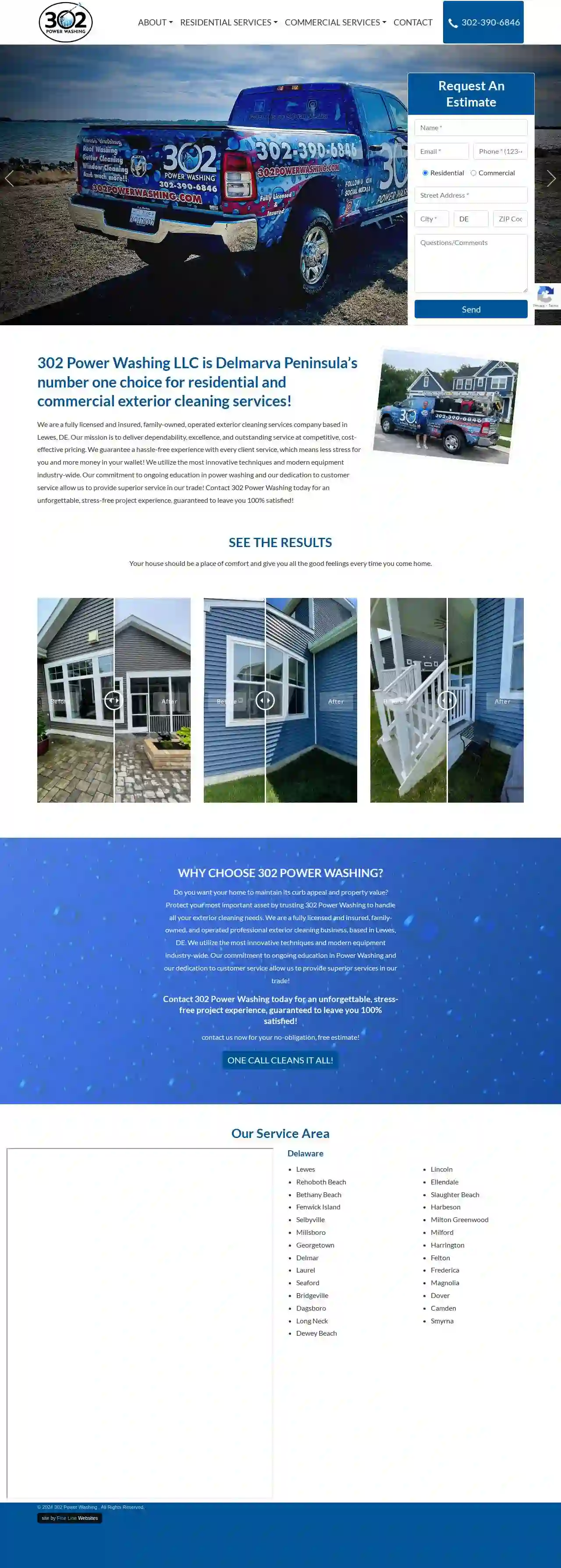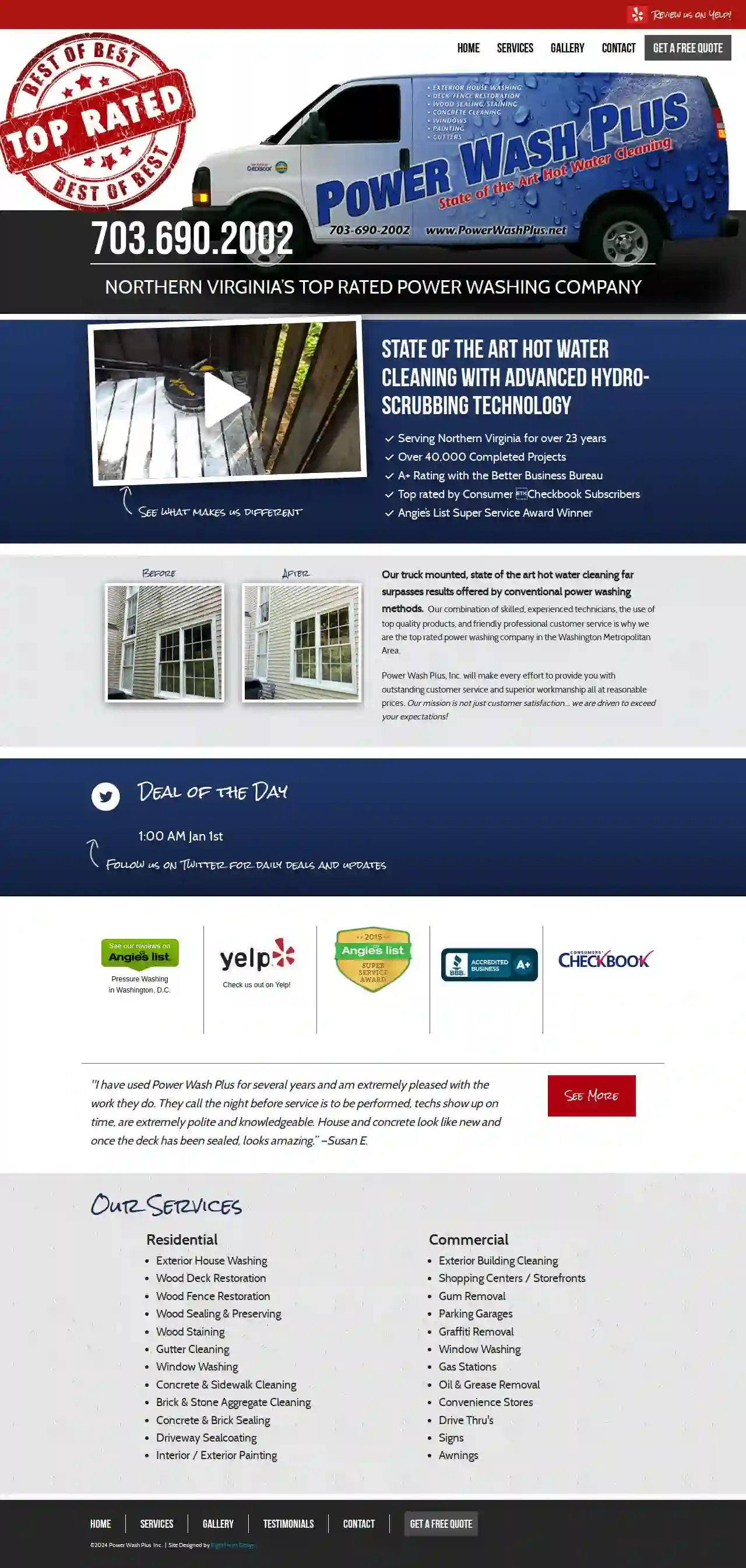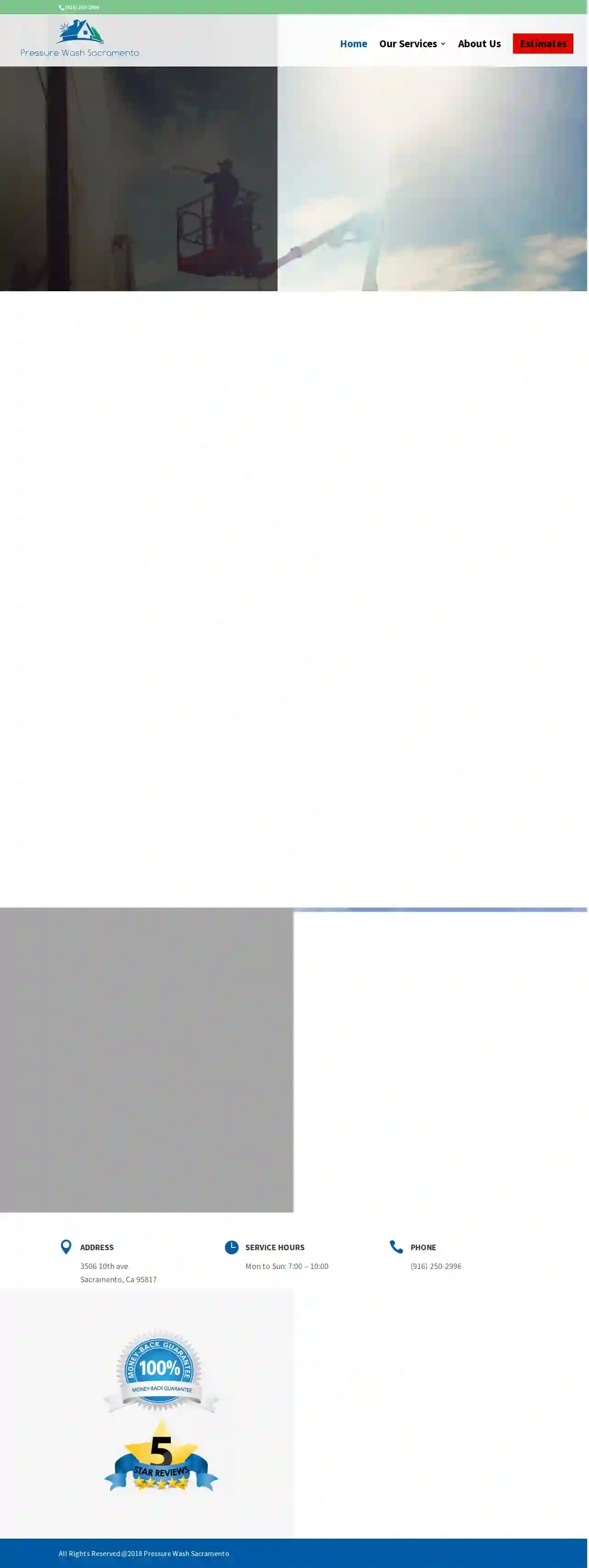Pressure Washing Ivanhoe
Find Exterior Cleaning in Ivanhoe
Get multiple Driveway Cleaning quotes for your project today! Compare profiles, reviews, accreditations, portfolio, etc... and choose the best service.

302 Power Washing
5148 reviews302 Power Washing LLC, Lewes, DE, 19958, US302 Power Washing LLC is Delmarva Peninsula’s number one choice for residential and commercial exterior cleaning services! We are a fully licensed and insured, family-owned, operated exterior cleaning services company based in Lewes, DE. Our mission is to deliver dependability, excellence, and outstanding service at competitive, cost-effective pricing. We guarantee a hassle-free experience with every client service, which means less stress for you and more money in your wallet! We utilize the most innovative techniques and modern equipment industry-wide. Our commitment to ongoing education in power washing and our dedication to customer service allow us to provide superior service in our trade! Contact 302 Power Washing today for an unforgettable, stress-free project experience, guaranteed to leave you 100% satisfied!
- Services
- Why Us?
- Gallery
Get Quote
Pressure Washing Richmond
59 reviews7850 W Grand Parkway S, #159, 7850 W Grand Parkway S #159, Richmond, 77406, USPressure Washing Richmond is your local & mobile power washing and soft wash company. Using industrial grade cleaners and knowledge of high + low pressure washing. We are mobile and your best power wash service in Richmond, Texas.
- Services
- Why Us?
- Accreditations
- Our Team
- Testimonials
- Gallery
Get Quote
Power Wash Plus Inc
4.942 reviews123 Main St, Fairfax, 22031, USPower Wash Plus, Inc. is a top-rated power washing company in the Washington Metropolitan Area, serving Northern Virginia for over 23 years. With over 40,000 completed projects, we pride ourselves on providing outstanding customer service and superior workmanship at reasonable prices. Our mission is not just customer satisfaction, but to exceed your expectations. We use state-of-the-art hot water cleaning with advanced hydro-scubbing technology, and our skilled and experienced technicians ensure that every job is done to perfection.
- Services
- Why Us?
- Accreditations
- Our Team
- Testimonials
- Gallery
Get Quote
Best Image Soft Wash
579 reviews123 Main St, Suite 101, Fairfield, 94533, USBest Image Soft Wash is a locally owned and operated exterior cleaning company based in Fairfield, California. We offer a wide range of services including house washing, roof washing, concrete cleaning, rust stain removal, deck washing, graffiti removal, solar panel cleaning, gutter brightening, oil stain removal, and exterior window washing. Our team is dedicated to providing top-notch services with integrity and building long-term relationships with our clients. We guarantee full customer satisfaction and ensure that our clients receive the clean, safe, and healthy home they deserve.
- Services
- Why Us?
- Accreditations
- Our Team
- Testimonials
- Gallery
Get Quote
Andy's Pressure Cleaning LLC
5110 reviewsSeaside, USAndy's Pressure Cleaning LLC is a locally owned and operated power washing company serving New Castle County, Delaware. We specialize in a wide range of cleaning services, including roof cleaning, soft washing, stucco cleaning, pressure washing, window washing, brick and paver restoration, rust removal, and more. Our team of experienced professionals is dedicated to providing high-quality, reliable service at competitive prices. We are fully licensed and insured, and we take pride in our commitment to customer satisfaction.
- Services
- Why Us?
- Our Team
- Gallery
Get Quote
The Best Power Washing
4.824 reviewsRichmond, USSay hello to the new! For over 18 years we have specialized in making grimy, worn out concrete, walls, fences, and siding look fresh and new! TheBestPower Washing offers residents in Northern Virginia, Maryland and D.C. top quality exterior services. Founder Esvin Merida, with 18+ years of experience, established the company with a mission to serve the community by rejuvenating homes and providing a one-stop reliable source for all your power washing needs.
- Services
- Why Us?
- Testimonials
- Gallery
Get Quote
3rd Coast Pressure Washing
522 reviews11111 N Dale Mabry Hwy, Suite 100, Tampa, 33619, US3rd Coast Pressure Washing is your local, family-owned and operated pressure washing company serving the greater Tampa Bay area. We are dedicated to providing high-quality pressure washing services at competitive prices. Our team of experienced professionals uses the latest equipment and techniques to ensure that your property looks its best. We offer a wide range of services, including residential and commercial pressure washing, roof cleaning, and more. Contact us today for a free estimate!
- Services
- Why Us?
Get Quote
Master Caulking Waterproof LLC./ Power Wash
4.730 reviewsChesterfield, USMaster Caulking Waterproof LLC (Power Wash) provides quality services with the professional attention our customers deserve. We offer a range of services, including pressure washing, gutter cleaning, window cleaning, caulking, exterior and interior painting, and concrete floor coating. Our commitment is to exceed your expectations and ensure your full satisfaction. We guarantee our work and strive to make each client completely happy. We are recognized for our high-quality services, exceptional efficiency, and professionalism. Whether you need pressure washing, window cleaning, or caulking, we've got you covered. Contact us today for a free estimate!
- Services
- Why Us?
- Gallery
Get Quote
Pressure Wash Sacramento
4.982 reviews3506 10th Ave, Sacramento, 95817, USPressure Wash Sacramento is Sacramento’s leading professional pressure washing services. Our team of exterior cleaning professionals take pride in cleaning homes and businesses in the Sacramento area and it shows. We offer a wide range of services to fit your needs when it comes to softwashing and pressure washing your property.
- Services
- Why Us?
- Gallery
Get Quote
Sea Spray Pressure Washing
5138 reviewsHackettstown, NJ, 07840, USSea Spray Pressure Washing is a family run small business with a passion for delivering high quality service you can count on. With over 15 years of experience, Danny and his crew of experts will bring curb appeal back to your siding, roof, patio, deck or desired exterior surface. We also provide commercial exterior cleaning, a great way to drive engagement among your employees. All of our house wash services include a 6 month warranty, all roof washes include a 1 year warranty from the return of mold. Our service area includes Warren County NJ, Morris County, Somerset County NJ, Hunterdon County NJ, Hackettstown NJ, Washington NJ, Washington Township NJ, Allamuchy NJ, Chester NJ, Mendham NJ, Basking Ridge NJ, Bernardsville NJ, Oxford NJ, Clinton NJ, Annandale NJ, Mansfield NJ, Mansfield Township NJ, Flanders NJ, Long Valley NJ, Budd Lake NJ, Rockaway NJ, Randolph NJ, Morristown NJ, Califon NJ, Belvidere NJ, Great Meadows NJ, Lake Hopatcong NJ, Denville NJ, Hopatcong NJ, Sparta NJ, Blairstown NJ, Phillipsburg NJ, Bloomsbury NJ, Stewartsville NJ and more. You can review our 5 star reputation on Thumbtack, Google and Facebook. Our quality surpasses the competition. We show up on time, call back all clients within 24 hours and go above and beyond during each and every job. Our reputation is and will continue to be the best and most trustworthy power washing company in NJ.
- Services
- Why Us?
- Accreditations
- Our Team
- Testimonials
- Gallery
Get Quote
Over 60,241+ Cleaning Businesses in our network
Our cleaning service providers operate in Ivanhoe and beyond!
CleaningMatch has curated and vetted Top Cleaning Companies in and around Ivanhoe. Find the most trustworthy business today.
Frequently Asked Questions About Pressure Washing
- Size of the Area: Larger areas generally cost more to pressure wash than smaller ones.
- Type of Surface: Different surfaces require different pressure levels and cleaning solutions, which can affect pricing.
- Condition of the Surface: Heavily soiled or stained surfaces may require more time and effort to clean, impacting cost.
- Accessibility: Difficult-to-reach areas may require specialized equipment and increase costs.
- Additional Services: Services like pre-treating stains, applying protective coatings, or mold removal may incur additional charges.
- Clear Obstructions: Remove any objects, furniture, or debris from the areas to be pressure washed.
- Close Windows and Doors: Securely close all windows and doors to prevent water or cleaning solutions from entering your home or building.
- Cover Delicate Surfaces: Protect delicate plants, landscaping, or electrical outlets with tarps, plastic sheeting, or painter's tape.
- Inform Your Neighbors: It's a courtesy to inform your neighbors about the scheduled pressure washing, especially if noise or overspray is a concern.
- Communicate Special Instructions: Inform the pressure washing company about any specific areas you want them to focus on or avoid.
- Cover or Shield Plants: Before pressure washing, cover or shield delicate plants and landscaping with tarps, plastic sheeting, or painter's tape to protect them from water spray and chemicals.
- Use Lower Pressure Settings: If pressure washing near plants, use lower pressure settings and avoid directing the spray directly at them.
- Rinse Plants with Water: After pressure washing, rinse plants thoroughly with plain water to dilute any chemicals that may have landed on them.
- Choose Plant-Safe Cleaning Solutions: If using cleaning solutions, opt for environmentally friendly or plant-safe options whenever possible.
- Hard Surfaces: Pressure washing is often successful in removing graffiti from hard surfaces like brick, concrete, or metal.
- Delicate Surfaces: For delicate surfaces like wood or painted surfaces, a gentler approach using specialized graffiti removal products and techniques may be necessary.
- Professional Graffiti Removal: For stubborn or extensive graffiti, consider hiring a professional graffiti removal service. They have specialized equipment, cleaning solutions, and experience in dealing with various types of graffiti.
How much does pressure washing cost?
To get accurate pricing, request quotes from multiple pressure washing companies. Provide details about the size and type of surface, its condition, and any additional services you require.
How do I prepare my property for pressure washing?
By taking these preparatory steps, you can ensure a safe and efficient pressure washing experience.
Can pressure washing damage my plants?
Taking these precautions minimizes the risk of damage to your plants and landscaping during pressure washing.
Can pressure washing remove graffiti?
If you're attempting DIY graffiti removal, always test the cleaning solution and pressure washing technique on an inconspicuous area first to avoid damaging the surface.
How much does pressure washing cost?
- Size of the Area: Larger areas generally cost more to pressure wash than smaller ones.
- Type of Surface: Different surfaces require different pressure levels and cleaning solutions, which can affect pricing.
- Condition of the Surface: Heavily soiled or stained surfaces may require more time and effort to clean, impacting cost.
- Accessibility: Difficult-to-reach areas may require specialized equipment and increase costs.
- Additional Services: Services like pre-treating stains, applying protective coatings, or mold removal may incur additional charges.
To get accurate pricing, request quotes from multiple pressure washing companies. Provide details about the size and type of surface, its condition, and any additional services you require.
How do I prepare my property for pressure washing?
- Clear Obstructions: Remove any objects, furniture, or debris from the areas to be pressure washed.
- Close Windows and Doors: Securely close all windows and doors to prevent water or cleaning solutions from entering your home or building.
- Cover Delicate Surfaces: Protect delicate plants, landscaping, or electrical outlets with tarps, plastic sheeting, or painter's tape.
- Inform Your Neighbors: It's a courtesy to inform your neighbors about the scheduled pressure washing, especially if noise or overspray is a concern.
- Communicate Special Instructions: Inform the pressure washing company about any specific areas you want them to focus on or avoid.
By taking these preparatory steps, you can ensure a safe and efficient pressure washing experience.
Can pressure washing damage my plants?
- Cover or Shield Plants: Before pressure washing, cover or shield delicate plants and landscaping with tarps, plastic sheeting, or painter's tape to protect them from water spray and chemicals.
- Use Lower Pressure Settings: If pressure washing near plants, use lower pressure settings and avoid directing the spray directly at them.
- Rinse Plants with Water: After pressure washing, rinse plants thoroughly with plain water to dilute any chemicals that may have landed on them.
- Choose Plant-Safe Cleaning Solutions: If using cleaning solutions, opt for environmentally friendly or plant-safe options whenever possible.
Taking these precautions minimizes the risk of damage to your plants and landscaping during pressure washing.
Can pressure washing remove graffiti?
- Hard Surfaces: Pressure washing is often successful in removing graffiti from hard surfaces like brick, concrete, or metal.
- Delicate Surfaces: For delicate surfaces like wood or painted surfaces, a gentler approach using specialized graffiti removal products and techniques may be necessary.
- Professional Graffiti Removal: For stubborn or extensive graffiti, consider hiring a professional graffiti removal service. They have specialized equipment, cleaning solutions, and experience in dealing with various types of graffiti.
If you're attempting DIY graffiti removal, always test the cleaning solution and pressure washing technique on an inconspicuous area first to avoid damaging the surface.
